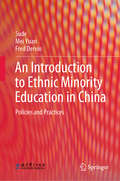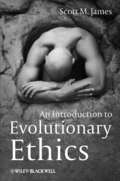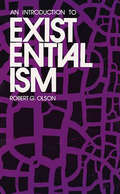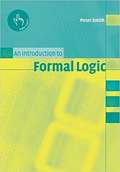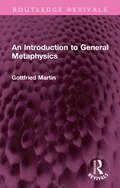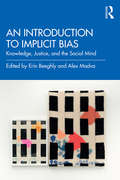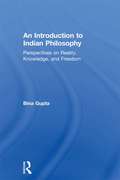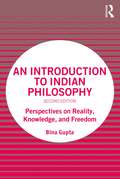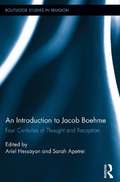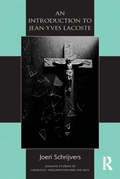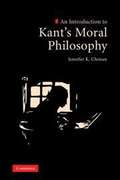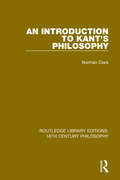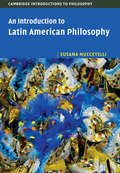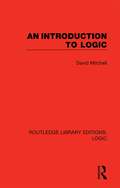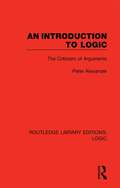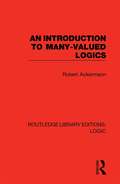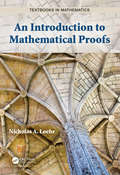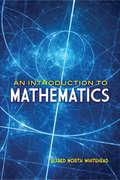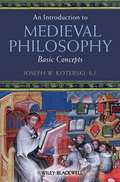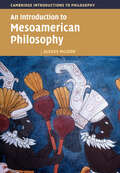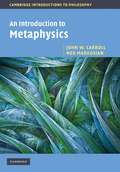- Table View
- List View
An Introduction to Ethnic Minority Education in China: Policies and Practices
by Fred Dervin Sude Mei YuanChinese ethnic minority education is virtually unknown to readers outside China. Based on extensive qualitative and quantitative data, this book examines the basic education policies for ethnic minorities in China and describes policy implementation. It also discusses successful case studies, restrictive factors, existing gaps and challenges as well as the associated problems, highlighting teacher training and the role of policymakers. The authors propose recommendations to address the challenges faced by Chinese education, and to develop and implement culturally sensitive basic education for ethnic minorities in the country. Offering a rare glimpse inside minority schools in different parts of the country, the book appeals to educators, scholars, decision-makers and anyone interested in diversity education (intercultural, multicultural, global education).
An Introduction to Evolutionary Ethics
by Scott M. JamesOffering the first general introductory text to this subject, the timely Introduction to Evolutionary Ethics reflects the most up-to-date research and current issues being debated in both psychology and philosophy. The book presents students to the areas of cognitive psychology, normative ethics, and metaethics. The first general introduction to evolutionary ethics Provides a comprehensive survey of work in three distinct areas of research: cognitive psychology, normative ethics, and metaethics Presents the most up-to-date research available in both psychology and philosophy Written in an engaging and accessible style for undergraduates and the interested general reader Discusses the evolution of morality, broadening its relevance to those studying psychology
An Introduction to Existentialism
by Robert G. OlsonIndispensable guide to one of the most influential thought systems of our century. Stressing the work of Heidegger and Sartre, it offers a careful and objective examination of the existentialist position and values -- freedom of choice, individual dignity, personal love, creative effort -- and answers to the eternal questions of the human condition.
An Introduction to Formal Logic
by Peter SmithFormal logic provides us with a powerful set of techniques for criticizing some arguments and showing others to be valid. These techniques are relevant to all of us with an interest in being skilful and accurate reasoners. In this highly accessible book, Peter Smith presents a guide to the fundamental aims and basic elements of formal logic. He introduces the reader to the languages of propositional and predicate logic, and then develops formal systems for evaluating arguments translated into these languages, concentrating on the easily comprehensible 'tree' method. His discussion is richly illustrated with worked examples and exercises. A distinctive feature is that, alongside the formal work, there is illuminating philosophical commentary. This book will make an ideal text for a first logic course, and will provide a firm basis for further work in formal and philosophical logic.
An Introduction to General Metaphysics (Routledge Revivals)
by Gottfried MartinFirst published in 1961, An Introduction to General Metaphysics presents Gottfried Martin’s careful study of many of the passages in Plato and Aristotle which deal with metaphysical problems and in particular with the Platonic Theory of Ideas. He has traced the development of the theory both in early works and in late works such as the Parmenides and the Sophistes; and with equal care he has studied the relative passages in Aristotle’s Metaphysics. He has quoted many of these passages at length and has offered a careful account and analysis of the progress of Plato’s thought. He has also discussed in a very interesting way the main passages relative to Aristotle’s criticism of Plato’s Theory of Ideas. This book is a must read for any student of Greek Philosophy and Philosophy in general.
An Introduction to Implicit Bias: Knowledge, Justice, and the Social Mind
by Erin Beeghly Alex MadvaWritten by a diverse range of scholars, this accessible introductory volume asks: What is implicit bias? How does implicit bias compromise our knowledge of others and social reality? How does implicit bias affect us, as individuals and participants in larger social and political institutions, and what can we do to combat biases? An interdisciplinary enterprise, the volume brings together the philosophical perspective of the humanities with the perspective of the social sciences to develop rich lines of inquiry. Its twelve chapters are written in a non-technical style, using relatable examples that help readers understand what implicit bias is, its significance, and the controversies surrounding it. Each chapter includes discussion questions and additional annotated reading suggestions, and a companion webpage contains teaching resources. The volume is an invaluable resource for students—and researchers—seeking to understand criticisms surrounding implicit bias, as well as how one might answer them by adopting a more nuanced understanding of bias and its role in maintaining social injustice.
An Introduction to Indian Philosophy
by Roy W. PerrettThis wide-ranging introduction to classical Indian philosophy is philosophically rigorous without being too technical for beginners. Through detailed explorations of the full range of Indian philosophical concerns, including some metaphilosophical issues, it provides readers with non-Western perspectives on central areas of philosophy, including epistemology, logic, metaphysics, ethics, philosophy of language, and philosophy of religion. Chapters are structured thematically, with each including suggestions for further reading. This provides readers with an informed overview whilst enabling them to focus on particular topics if needed. Translated Sanskrit texts are accompanied by authorial explanations and contextualisations, giving the reader an understanding of the argumentative context and philosophical style of Indian texts. A detailed glossary and a guide to Sanskrit pronunciation equip readers with the tools needed for reading and understanding Sanskrit terms and names. The book will be an essential resource for both beginners and advanced students of philosophy and Asian studies.
An Introduction to Indian Philosophy: Perspectives on Reality, Knowledge, and Freedom
by Bina GuptaAn Introduction to Indian Philosophy offers a profound yet accessible survey of the development of India’s philosophical tradition. Beginning with the formation of Brahmanical, Jaina, Materialist, and Buddhist traditions, Bina Gupta guides the reader through the classical schools of Indian thought, culminating in a look at how these traditions inform Indian philosophy and society in modern times. Offering translations from source texts and clear explanations of philosophical terms, this text provides a rigorous overview of Indian philosophical contributions to epistemology, metaphysics, philosophy of language, and ethics. This is a must-read for anyone seeking a reliable and illuminating introduction to Indian philosophy.
An Introduction to Indian Philosophy: Perspectives on Reality, Knowledge, and Freedom
by Bina GuptaAn Introduction to Indian Philosophy offers a profound yet accessible survey of the development of India’s philosophical tradition. Beginning with the formation of Brāhmaṇical, Jaina, Materialist, and Buddhist traditions, Bina Gupta guides the reader through the classical schools of Indian thought, culminating in a look at how these traditions inform Indian philosophy and society in modern times. Offering translations from source texts and clear explanations of philosophical terms, this text provides a rigorous overview of Indian philosophical contributions to epistemology, metaphysics, philosophy of language, and ethics. This is a must-read for anyone seeking a reliable and illuminating introduction to Indian philosophy. Key Updates in the Second Edition Reorganized into seven parts and fifteen chapters, making it easier for instructors to assign chapters for a semester-long course. Continues to introduce systems historically, but focuses on new key questions and issues within each system. Details new arguments, counter-arguments, objections, and their reformulations in the nine schools of Indian philosophy. Offers expanded discussion of how various schools of Indian philosophy are engaged with each other. Highlights key concepts and adds new grey boxes to explain selected key concepts. Includes a new section that problematizes the Western notion of "philosophy." New Suggested Readings sections are placed at the end of each chapter, which include recommended translations, a bibliography of important works, and pertinent recent scholarship for each school. Adds a new part (Part III) that explains the difficulties involved in translating from Sanskrit into English, discusses fundamental concepts and conceptual distinctions often used to present Indian philosophy to Western students, and reviews important features and maxims that most darśanas follow. Provides new examples of applications to illustrate more obscure concepts and principles.
An Introduction to Jacob Boehme: Four Centuries of Thought and Reception (Routledge Studies in Religion)
by Ariel Hessayon Sarah ApetreiThis volume brings together for the first time some of the world’s leading authorities on the German mystic Jacob Boehme, to illuminate his thought and its reception over four centuries for the benefit of students and advanced scholars alike. Boehme’s theosophical works have influenced Western culture in profound ways since their dissemination in the early 17th Century, and these interdisciplinary essays trace the social and cultural networks as well as the intellectual pathways involved in Boehme’s enduring impact. The chapters range from situating Boehme in the 16th Century Radical Reformation, to discussions of his significance in modern theology. They explore the major contexts for Boehme’s reception including the Pietist movement, Russian religious thought and Western esotericism, as well as focusing more closely on important readers: the religious radicals of the English Civil Wars and the later English Behmenists; literary figures such as Goethe and Blake, and great philosophers of the modern age, among them Schelling and Hegel. Together, the chapters illustrate the depth and variety of Boehme’s influence and a concluding chapter addresses directly an underlying theme of the volume – asking why Boehme matters today, and how readers in the present might be enriched by a fresh engagement with his apparently opaque and complex writings.
An Introduction to Jean-Yves Lacoste (Routledge Studies in Theology, Imagination and the Arts)
by Joeri SchrijversIntroducing the thought of philosopher and theologian Jean-Yves Lacoste, this book provides an overview spanning Lacoste's earliest works on sacramentality to his latest work Etre en Danger (2011) in which Lacoste opens up the liturgical experience onto a spiritual experience of life. Schrijvers unfolds the logic of what Lacoste calls 'the liturgical experience' from its violent variety in Expérience et Absolu to the logic of love and love's possibility as it is developed in the later works. Throughout the book, the focus is on Lacoste's dialogue with Heidegger and through this his attempt to widen the scope of phenomenology to include the phenomenality of the divine.
An Introduction to Kant'S Moral Philosophy
by Jennifer K. UlemanImmanuel Kant's moral philosophy is one of the most distinctive achievements of the European Enlightenment. At its heart lies what Kant called the 'strange thing': the free, rational, human will. This introduction explores the basis of Kant's anti-naturalist, secular, humanist vision of the human good. Moving from a sketch of the Kantian will, with all its component parts and attributes, to Kant's canonical arguments for his categorical imperative, this introduction shows why Kant thought his moral law the best summary expression of both his own philosophical work on morality and his readers' deepest shared convictions about the good. Kant's central tenets, key arguments, and core values are presented in an accessible and engaging way, making this book ideal for anyone eager to explore the fundamentals of Kant's moral philosophy.
An Introduction to Kant's Philosophy (Routledge Library Editions: 18th Century Philosophy #8)
by Norman ClarkEmmanuel Kant has the distinction of having introduced a great revolution into philosophy and yet stood the test of time. He stands as one of the great foundation stones of modern thought. This book, first published in 1925, covers Kant’s works essential to his philosophy as a system, and also illustrates his position in the history of thought. It is a clear and accurate statement of Kant’s chief doctrines.
An Introduction to Latin American Philosophy (Cambridge Introductions to Philosophy)
by Susana NuccetelliLatin American philosophy is best understood as a type of applied philosophy devoted to issues related to the culture and politics of Latin America. This introduction provides a comprehensive overview of its central topics. It explores not only the unique insights offered by Latin American thinkers into the traditional pre-established fields of Western philosophy, but also the many 'isms' developed as a direct result of Latin American thought. Many concern matters of practical ethics and social and political philosophy, such as Lascasianism, Arielism, Bolívarism, modest and immodest feminisms, republicanism, positivism, Marxism, and liberationism. But there are also meta-philosophical 'isms' such as originalism and perspectivism. Together with clear and accessible discussions of the major issues and arguments, the book offers helpful summaries, suggestions for further reading, and a glossary of terms. It will be valuable for all readers wanting to explore the richness and diversity of Latin American philosophy.
An Introduction to Logic (Routledge Library Editions: Logic)
by David MitchellOriginally published in 1967. The common aim of all logical enquiry is to discover and analyse correctly the forms of valid argument. In this book concise expositions of traditional, Aristotelian logic and of modern systems of propositional and predicative logic show how far that aim has been achieved.
An Introduction to Logic: The Criticism of Arguments (Routledge Library Editions: Logic)
by Peter AlexanderOriginally published in 1969. This book is for undergraduates whether specializing in philosophy or not. It assumes no previous knowledge of logic but aims to show how logical notions arise from, or are abstracted from, everyday discourse, whether technical or non-technical. It sets out a knowledge of principles and, while not historical, gives an account of the reasons for which modern systems have emerged from the traditional syllogistic logic, demonstrating how certain central ideas have developed. The text explains the connections between everyday reasoning and formal logic and works up to a brief sketch of systems of propositional calculus and predicate-calculus, using both the axiomatic method and the method of natural deduction. It provides a self-contained introduction but for those who intend to study the subject further it contains many suggestions and a sound basis for more advanced study.
An Introduction to Many-valued Logics (Routledge Library Editions: Logic)
by Robert AckermannOriginally published in 1967. An introduction to the literature of nonstandard logic, in particular to those nonstandard logics known as many-valued logics. Part I expounds and discusses implicational calculi, modal logics and many-valued logics and their associated calculi. Part II considers the detailed development of various many-valued calculi, and some of the important metathereoms which have been proved for them. Applications of the calculi to problems in the philosophy are also surveyed. This work combines criticism with exposition to form a comprehensive but concise survey of the field.
An Introduction to Mathematical Proofs (Textbooks in Mathematics)
by Nicholas A. LoehrAn Introduction to Mathematical Proofs presents fundamental material on logic, proof methods, set theory, number theory, relations, functions, cardinality, and the real number system. The text uses a methodical, detailed, and highly structured approach to proof techniques and related topics. No prerequisites are needed beyond high-school algebra. New material is presented in small chunks that are easy for beginners to digest. The author offers a friendly style without sacrificing mathematical rigor. Ideas are developed through motivating examples, precise definitions, carefully stated theorems, clear proofs, and a continual review of preceding topics. Features Study aids including section summaries and over 1100 exercises Careful coverage of individual proof-writing skills Proof annotations and structural outlines clarify tricky steps in proofs Thorough treatment of multiple quantifiers and their role in proofs Unified explanation of recursive definitions and induction proofs, with applications to greatest common divisors and prime factorizations About the Author: Nicholas A. Loehr is an associate professor of mathematics at Virginia Technical University. He has taught at College of William and Mary, United States Naval Academy, and University of Pennsylvania. He has won many teaching awards at three different schools. He has published over 50 journal articles. He also authored three other books for CRC Press, including Combinatorics, Second Edition, and Advanced Linear Algebra.
An Introduction to Mathematical Reasoning
by Peter J. EcclesThis book eases students into the rigors of university mathematics. The emphasis is on understanding and constructing proofs and writing clear mathematics. The author achieves this by exploring set theory, combinatorics, and number theory, topics that include many fundamental ideas and may not be a part of a young mathematician's toolkit. This material illustrates how familiar ideas can be formulated rigorously, provides examples demonstrating a wide range of basic methods of proof, and includes some of the all-time-great classic proofs. The book presents mathematics as a continually developing subject. Material meeting the needs of readers from a wide range of backgrounds is included. The over 250 problems include questions to interest and challenge the most able student but also plenty of routine exercises to help familiarize the reader with the basic ideas.
An Introduction to Mathematics (Dover Books on Mathematics)
by Alfred North Whitehead"The object of the following chapters is not to teach mathematics, but to enable students from the very beginning of their course to know what the science is about, and why it is necessarily the foundation of exact thought as applied to natural phenomena." Thus begins this volume by the prominent English philosopher and mathematician Alfred North Whitehead, a concise statement on the nature and meaning of mathematics for the general student. Expertly written and abounding in insights, the book presents a lively exposition of mathematical concepts, the history of their development, and their applications to the physical world. Whitehead explains in broad terms what mathematics is about, what it does, and how mathematicians do it.Generations of readers who have stayed with the philosopher from the beginning to the end have found themselves amply rewarded for taking this journey.
An Introduction to Medieval Philosophy: Basic Concepts
by Joseph W. KoterskiBy exploring the philosophical character of some of the greatest medieval thinkers, An Introduction to Medieval Philosophy provides a rich overview of philosophy in the world of Latin Christianity. Explores the deeply philosophical character of such medieval thinkers as Augustine, Boethius, Eriugena, Anselm, Aquinas, Bonaventure, Scotus, and Ockham Reviews the central features of the epistemological and metaphysical problem of universals Shows how medieval authors adapted philosophical ideas from antiquity to apply to their religious commitments Takes a broad philosophical approach of the medieval era by,taking account of classical metaphysics, general culture, and religious themes
An Introduction to Mesoamerican Philosophy (Cambridge Introductions to Philosophy)
by Alexus McLeodThe philosophy of Mesoamerica – the indigenous groups of precolonial North-Central America – is rich and varied but relatively little-known. In this ground-breaking book, Alexus McLeod introduces the philosophical traditions of the Maya, Nahua (Aztecs), Mixtecs, Zapotecs, and others, focussing in particular on their treatment of language, truth, time, creation, personhood, knowledge, and morality. His wide-ranging discussion includes important texts of world literature such as the K'iche Maya Popol Vuh and the Aztec Florentine Codex, as well as precolonial glyphic texts and imagery. This comprehensive and accessible book will give students, specialists and other interested readers an understanding of Mesoamerican philosophy and a sense of the current scholarship in the field.
An Introduction to Metametaphysics
by Tuomas E. TahkoHow do we come to know metaphysical truths? How does metaphysical inquiry work? Are metaphysical debates substantial? These are the questions which characterize metametaphysics. This book, the first systematic student introduction dedicated to metametaphysics, discusses the nature of metaphysics - its methodology, epistemology, ontology and our access to metaphysical knowledge. It provides students with a firm grounding in the basics of metametaphysics, covering a broad range of topics in metaontology such as existence, quantification, ontological commitment and ontological realism. Contemporary views are discussed along with those of Quine, Carnap and Meinong. Going beyond the metaontological debate, thorough treatment is given to novel topics in metametaphysics, including grounding, ontological dependence, fundamentality, modal epistemology, intuitions, thought experiments and the relationship between metaphysics and science. The book will be an essential resource for those studying advanced metaphysics, philosophical methodology, metametaphysics, epistemology and the philosophy of science.
An Introduction to Metaphilosophy
by Søren Overgaard Paul Gilbert Stephen Burwood Søren Overgaard Paul GilbertWhat is philosophy? How should we do it? Why should we bother to? These are the kinds of questions addressed by metaphilosophy – the philosophical study of the nature of philosophy itself. Students of philosophy today are faced with a confusing and daunting array of philosophical methods, approaches and styles and also deep divisions such as the notorious rift between analytic and Continental philosophy. This book takes readers through a full range of approaches – analytic versus Continental, scientistic versus humanistic, 'pure' versus applied – enabling them to locate and understand these different ways of doing philosophy. Clearly and accessibly written, it will stimulate reflection on philosophical practice and will be invaluable for students of philosophy and other philosophically inclined readers.
An Introduction to Metaphysics
by John W. Carroll Ned MarkosianThis book is an accessible introduction to the central themes of contemporary metaphysics. It carefully considers accounts of causation, freedom and determinism, laws of nature, personal identity, mental states, time, material objects, and properties, while inviting students to reflect on metaphysical problems. The philosophical questions discussed include: What makes it the case that one event causes another event? What are material objects? Given that material objects exist, do such things as properties exist? What makes it the case that a person may exist at two different times? An Introduction to Metaphysics makes these tough questions tractable by presenting the features and flaws of current attempts to answer them. Intended primarily for students taking a first class in metaphysics, this lucid and well-written text would also provide an excellent introduction for anyone interested in knowing more about this important area of philosophy.
